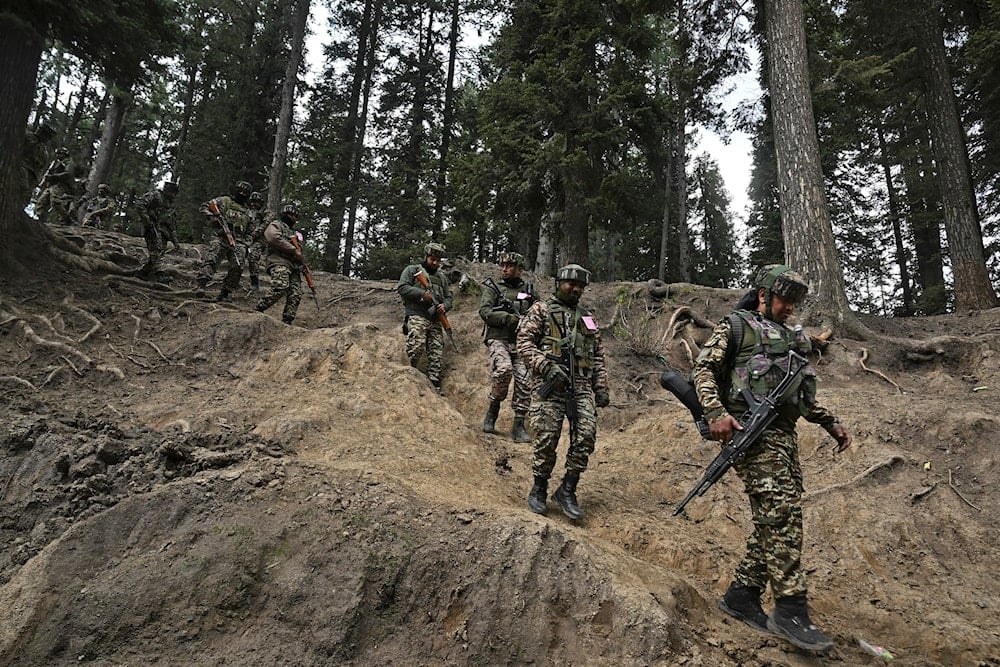India ramps up diplomatic pressure on Pakistan after Kashmir attack
India suspends Indus Waters Treaty and closes border with Pakistan following a deadly attack on civilians in Kashmir.
-
 Indian soldiers trek back after a search operation around Baisaran meadow in the aftermath of an attack in Pahalgam, about 90 km (55 miles) from Srinagar on April 23, 2025. (AFP)
Indian soldiers trek back after a search operation around Baisaran meadow in the aftermath of an attack in Pahalgam, about 90 km (55 miles) from Srinagar on April 23, 2025. (AFP)
India has taken a series of punitive diplomatic steps against Pakistan, accusing Islamabad of supporting "cross-border terrorism" following a deadly assault on civilians in Indian-administered Kashmir.
The escalation comes after gunmen killed 26 tourists in the region’s Pahalgam area, marking the deadliest attack on civilians in Kashmir in over two decades.
Pakistan has denied any involvement in the attack. However, the incident has plunged India-Pakistan relations to their lowest point in years, raising fears that New Delhi’s diplomatic moves could lead to further military action.
Details of Pahalgam shooting
The attack occurred on Tuesday as tourists were enjoying the scenic mountain views in Pahalgam, a popular destination in the disputed Himalayan region. Armed assailants emerged from the surrounding forest, opening fire with automatic weapons on unsuspecting visitors.
The victims, 25 Indian nationals and one Nepali, were targeted in what Indian authorities are calling a shift toward attacking civilians and undermining Kashmir’s vital tourism sector. This is in contrast to more frequent assaults on security forces.
No group has claimed responsibility for the attack, which took place in the Muslim-majority region where an insurgency has persisted since 1989, with rebels seeking either independence or a merger with Pakistan.
Indus Waters Treaty suspension and border closure
In response, Indian Foreign Secretary Vikram Misri announced a raft of measures against Pakistan. Chief among them is the suspension of the Indus Waters Treaty, a 1960 agreement critical for sharing water from Himalayan tributaries.
The treaty will remain suspended "until Pakistan credibly and irrevocably abjures (rejects) its support for cross-border terrorism," Misri stated during a press conference in New Delhi.
Additionally, India has shut down the main land border crossing with Pakistan and initiated a reduction in diplomatic staff, recalling Indian personnel from Islamabad and expelling Pakistani diplomats.
Reactions from India and Pakistan
Indian Prime Minister Narendra Modi condemned the attack, vowing that those responsible for the "heinous act" would be brought to justice.
"Their evil agenda will never succeed," Modi declared.
Pakistan, while denying any role in the Pahalgam shooting, has promised a "tit-for-tat response". Deputy Prime Minister Ishaq Dar indicated that Islamabad’s National Security Committee, a high-level body convened only in exceptional circumstances, would meet to formulate a comprehensive reply.
Defense Minister Khawaja Asif accused India of using the incident as a pretext to withdraw from the water-sharing accord, while offering condolences to the victims’ families.
Historical context of India-Pakistan relations in Kashmir
India and Pakistan, both nuclear-armed, have a long-standing history of mutual accusations regarding support for militant groups operating in Kashmir. The region has witnessed numerous flashpoints, including the Pulwama attack in 2019, where 40 Indian paramilitary personnel were killed.
Since 2019, when the Indian government revoked Kashmir’s limited autonomy, there has been a relative lull in large-scale violence. However, the recent attack has revived concerns about renewed conflict.
Analyst Michael Kugelman warned that the situation poses a "very serious risk of a new crisis between India and Pakistan, and probably the most serious risk since the brief military conflict that happened in 2019."
India plans to hold an all-party meeting to discuss the crisis and brief top political leaders on potential further actions.
The last major attack on civilians in Kashmir occurred in 2000, claiming 36 lives, making the Kashmir attack of 2025 one of the most severe in recent memory.
Read more: Kashmiris protest 'Israel's' assassination of Sayyed Nasrallah

 4 Min Read
4 Min Read










